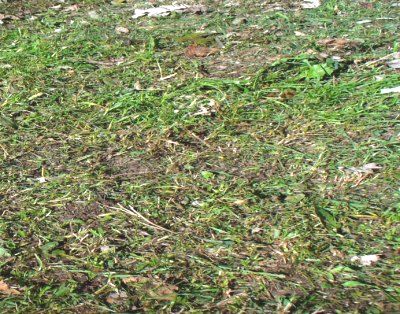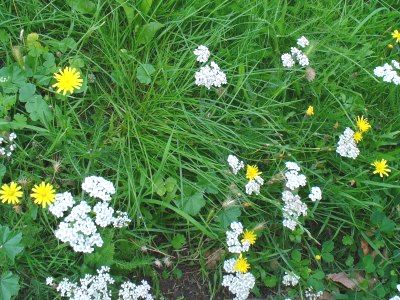Green Land Management - an Oxymoron?
Walking through my local public park the other day, I was enchanted by the beauty of the fallen leaves - a glorious patchwork of yellows, reds and browns, each tree with its characteristic hues in the sunlight. It's one of the delights of Autumn.
But I hadn't gone very far before I encountered gang of men in fluorescent jackets performing grounds maintenance. Their lorry had left tracks of churned mud across the grass, from which they were clearing fallen leaves with petrol-powered blowers.
To me this is indefensible for several reasons. Leaf litter forms part of a natural nutrient cycle and is also a habitat for decomposers such as fungi and insects that are in their turn essential food for other creatures as the days get colder. So clearing the leaf litter away is detrimental to the parkland ecosystem. But even if one ignores that important consideration, a petrol-powered blower seems an inappropriate choice of tool for the job. To emit exhaust fumes and noise doing what could be accomplished with a stiff broom or hay rake cleanly and quietly doesn't seem very "green" to me. And to churn up the grass with a heavy lorry in the process of "cleaning" it seems daft.
 Our local authorities use our money to maintain public open spaces on our behalf. But they sometimes seem not unduly thoughtful custodians of the huge tracts of land for which they are responsible. One senses that the stewardship can be seen as a burden rather than a privilege accompanied by responsibilities. The result is typically large tracts of scalped bare ground like that in this picture, which often barely recovers even its grasses (let alone any wild flowers) before it gets scalped again.
Our local authorities use our money to maintain public open spaces on our behalf. But they sometimes seem not unduly thoughtful custodians of the huge tracts of land for which they are responsible. One senses that the stewardship can be seen as a burden rather than a privilege accompanied by responsibilities. The result is typically large tracts of scalped bare ground like that in this picture, which often barely recovers even its grasses (let alone any wild flowers) before it gets scalped again.
The most common defence of such damage is that of "cost". But it costs nothing - after the initial adjustment of the mowers - to cut the grass less short, and it's actually cheaper to let the leaf litter lie naturally than to clear it away, damaging the local ecosystem in the process. So it's not really a matter of cost - it's a course of action born of a world view that requires everything to be artificially "neat and tidy"
 But the healthy natural world is not neat and tidy - it's chaotic but teeming with life. The low-cut monoculture of grass that it seems to be the aim of most local authorities to maintain is sterile by comparison, providing habitat for very few creatures. So many species from bees to robins are abandoning our urban landscape. The grass in this picture hasn't been specially managed to encourage wild flowers - it's a mere few yards from the scalped grass in the first picture, but in an area the mower can't reach.
But the healthy natural world is not neat and tidy - it's chaotic but teeming with life. The low-cut monoculture of grass that it seems to be the aim of most local authorities to maintain is sterile by comparison, providing habitat for very few creatures. So many species from bees to robins are abandoning our urban landscape. The grass in this picture hasn't been specially managed to encourage wild flowers - it's a mere few yards from the scalped grass in the first picture, but in an area the mower can't reach.
But even this small pocket of apparent diversity is pretty degraded. Well over a hundred grassland wild flowers are recorded in the national flora for Hertfordshire, and I have identified over sixty in various undisturbed places around the county. Here, there are less than ten.
What can be done to reverse this decline? The potential contribution of properly managed public open spaces nationwide to wild habitats is enormous, but largely unrealised. Our public authorities could manage the land they hold on our behalf in a manner more sensitive to the living ecosystem. But they respond to popular demand, so if we want them to do so it's up to us to tell them.
To me this is indefensible for several reasons. Leaf litter forms part of a natural nutrient cycle and is also a habitat for decomposers such as fungi and insects that are in their turn essential food for other creatures as the days get colder. So clearing the leaf litter away is detrimental to the parkland ecosystem. But even if one ignores that important consideration, a petrol-powered blower seems an inappropriate choice of tool for the job. To emit exhaust fumes and noise doing what could be accomplished with a stiff broom or hay rake cleanly and quietly doesn't seem very "green" to me. And to churn up the grass with a heavy lorry in the process of "cleaning" it seems daft.
 Our local authorities use our money to maintain public open spaces on our behalf. But they sometimes seem not unduly thoughtful custodians of the huge tracts of land for which they are responsible. One senses that the stewardship can be seen as a burden rather than a privilege accompanied by responsibilities. The result is typically large tracts of scalped bare ground like that in this picture, which often barely recovers even its grasses (let alone any wild flowers) before it gets scalped again.
Our local authorities use our money to maintain public open spaces on our behalf. But they sometimes seem not unduly thoughtful custodians of the huge tracts of land for which they are responsible. One senses that the stewardship can be seen as a burden rather than a privilege accompanied by responsibilities. The result is typically large tracts of scalped bare ground like that in this picture, which often barely recovers even its grasses (let alone any wild flowers) before it gets scalped again.The most common defence of such damage is that of "cost". But it costs nothing - after the initial adjustment of the mowers - to cut the grass less short, and it's actually cheaper to let the leaf litter lie naturally than to clear it away, damaging the local ecosystem in the process. So it's not really a matter of cost - it's a course of action born of a world view that requires everything to be artificially "neat and tidy"
 But the healthy natural world is not neat and tidy - it's chaotic but teeming with life. The low-cut monoculture of grass that it seems to be the aim of most local authorities to maintain is sterile by comparison, providing habitat for very few creatures. So many species from bees to robins are abandoning our urban landscape. The grass in this picture hasn't been specially managed to encourage wild flowers - it's a mere few yards from the scalped grass in the first picture, but in an area the mower can't reach.
But the healthy natural world is not neat and tidy - it's chaotic but teeming with life. The low-cut monoculture of grass that it seems to be the aim of most local authorities to maintain is sterile by comparison, providing habitat for very few creatures. So many species from bees to robins are abandoning our urban landscape. The grass in this picture hasn't been specially managed to encourage wild flowers - it's a mere few yards from the scalped grass in the first picture, but in an area the mower can't reach.But even this small pocket of apparent diversity is pretty degraded. Well over a hundred grassland wild flowers are recorded in the national flora for Hertfordshire, and I have identified over sixty in various undisturbed places around the county. Here, there are less than ten.
What can be done to reverse this decline? The potential contribution of properly managed public open spaces nationwide to wild habitats is enormous, but largely unrealised. Our public authorities could manage the land they hold on our behalf in a manner more sensitive to the living ecosystem. But they respond to popular demand, so if we want them to do so it's up to us to tell them.
